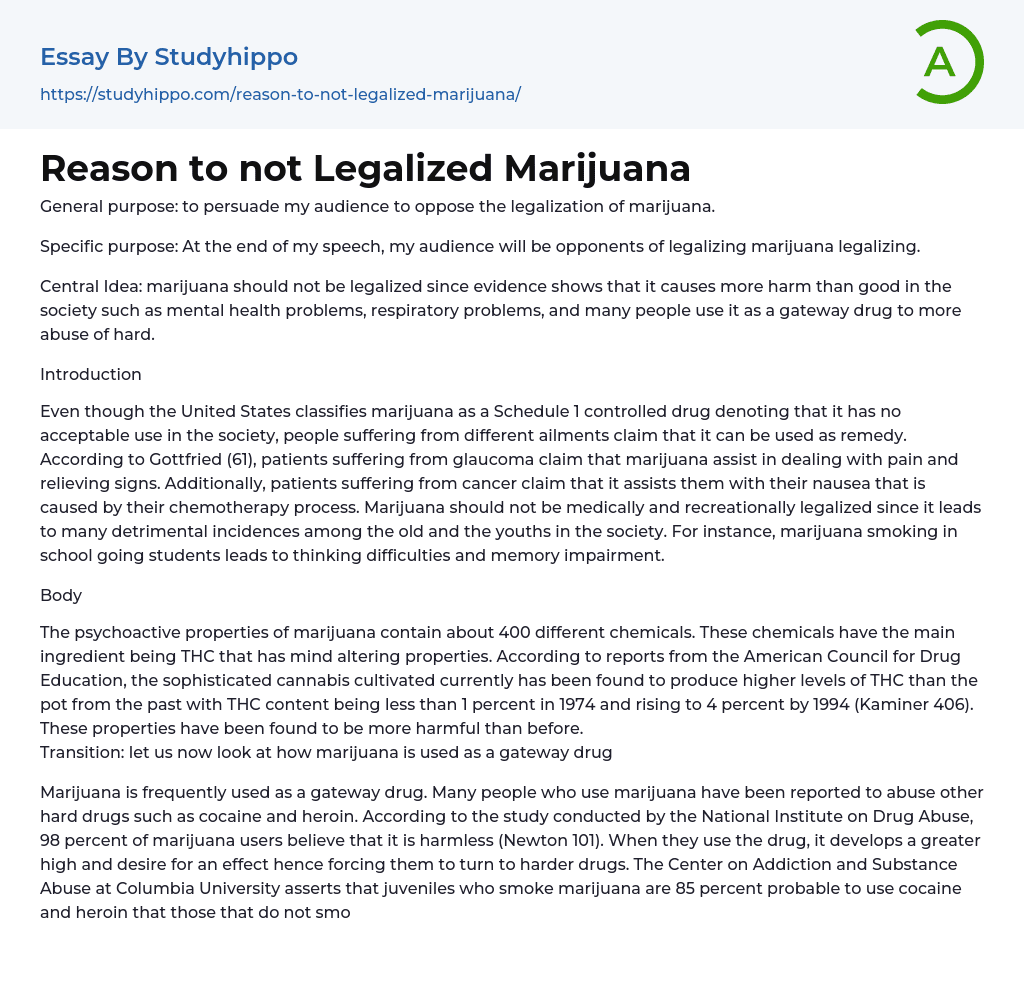Introduction
General purpose: The main objective is to persuade the audience against the legalization of marijuana.
Specific purpose: By the end of the speech, the goal is for the audience to oppose legalizing marijuana.
Central Idea: Evidence suggests that marijuana should not be legalized due to its negative impact on society, such as mental health problems, respiratory problems, and its potential as a gateway drug leading to further substance abuse.
In spite of being classified as a Schedule 1 controlled drug in the United States - indicating no acceptable use in society - individuals with various ailments argue that it can serve as a remedy.
According to Gottfried (61), glaucoma patients contend that marijuana has advantages in terms of pain management and relieving symptoms. Similarly, cancer patients assert that it assists in reducing chemotherapy-induced nausea. Nonetheless, it i
...s crucial to refrain from legalizing both medical and recreational use of marijuana due to the adverse effects on older individuals and young people within society. For instance, smoking marijuana among students at school leads to cognitive difficulties and memory impairment.
Body
Marijuana comprises around 400 different chemicals possessing psychoactive properties, with THC being the primary component responsible for altering one's mental state.
Reports from the American Council for Drug Education indicate that cannabis cultivation has progressed and now produces higher levels of THC compared to previous marijuana. In 1974, THC content was less than 1 percent, but by 1994 it had increased to 4 percent (Kaminer 406), resulting in more damaging qualities. Moreover, marijuana is frequently used as a gateway drug, leading users towards the abuse of harder substances like cocaine and heroin. A study conducted by the National Institute on Drug Abuse uncovered that
98 percent of marijuana users perceive it as harmless (Newton 101). However, once they use the drug, they experience a more intense high and develop a craving for stronger effects, ultimately pushing them towards harder drugs.
According to the Center on Addiction and Substance Abuse at Columbia University, juveniles who smoke marijuana are 85 percent more likely to use cocaine and heroin compared to non-marijuana smokers (Kaminer 458).
Transition: Now let's examine the health problems associated with marijuana usage. Marijuana consumption can result in mental health issues such as impaired short-term memory, which hinders users' ability to learn and retain information, particularly for complex tasks. The United States Drug Enforcement Administration states that marijuana usage impacts various skills required for safe driving (Newton 158). Research conducted by NIDA revealed that between 4-14 percent of drivers injured or killed in accidents tested positive for the active ingredient found in marijuana.
Research data indicates that marijuana use can impair balance and coordination, which are crucial for driving. These effects can persist for up to 24 hours after smoking (Kuhar 154). Therefore, it is important to discourage the use of marijuana due to its negative consequences for individuals of all ages.
Conclusion
- There is a growing concern regarding the health risks associated with marijuana.
- Marijuana poses a potential danger of respiratory organ damage for both young and old individuals.
- While definitive evidence may be lacking, it is advisable to discourage the use of marijuana by anyone due to possible long-term public health issues.
Work Cited
- Gottfried, Ted. The Facts About Marijuana. New York: Benchmark Books, 2005. Print.
- Kaminer, Yifrah?. Adolescent Substance Use Disorders. St. Louis, Mo.: Elsevier
Health Sciences, 2010. Internet resource.
- Upper Saddle River, N.J: FT Press, 2012. Print.
- Newton, David E. Marijuana: A Reference Handbook. Santa Barbara, Calif: ABC-CLIO, 2013.
Print.
- alternative medicine essays
- Aspirin essays
- Cannabis essays
- Cardiology essays
- Cloning essays
- Dentist essays
- drugs essays
- Hemoglobin essays
- Medical essays
- Medical Ethics essays
- Organ Donation essays
- Patient essays
- Pharmacology essays
- Plastic Surgery essays
- Surgery essays
- Therapy essays
- Vaccines essays
- Agreement essays
- Business Law essays
- Common Law essays
- Community Policing essays
- Constitution essays
- Consumer Protection essays
- Contract essays
- Contract Law essays
- Copyright Infringement essays
- Court essays
- Crime essays
- Criminal Law essays
- Employment Law essays
- Family Law essays
- Injustice essays
- Judge essays
- Jury essays
- Justice essays
- Lawsuit essays
- Lawyer essays
- Marijuana Legalization essays
- Ownership essays
- Police essays
- Property essays
- Protection essays
- Security essays
- Tort Law essays
- Treaty essays
- United States Constitution essays
- War on Drugs essays
- Cocaine essays
- Drug Abuse essays
- Teenage Drug Abuse essays




